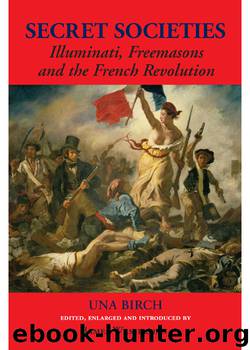Secret Societies by James Wasserman

Author:James Wasserman
Language: eng
Format: epub
Publisher: Ibis Press
A famous scene took place in the Assembly when Gobel, his vicars, and several curés declared that they wished to shake off the character that had been conferred on them by superstition. Mad applause greeted Gobel's surrender of cross and ring, and adoption of the red cap of liberty. After the retractations came a display of patriotic offerings. Both into the Convention and the Commune a stream of sacred vessels, sacerdotal ornaments and embroidered vestments flowed. The vestments of “unutterable Dubois” caparisoned an ass. His mitre was bound upon its ears. The “spoils of superstition” were handed over to a specially appointed committee to deal with, and all the actors in this scene drank from a chalice the wine of brotherly love.
As time went on, a kind of ruthlessness laid hold of good Republicans. From talking of Lycurgus, and dreaming of the stern days of old, they became in character and action inflexible and without pity. Women went proudly and unshriven to the scaffold. Men emulated Scaevola and Cato. Adam Lux called Charlotte Corday greater then Brutus, and Madame Roland sustained herself in “that pasture of great souls,” The Lives of Plutarch. Abbé Barthélemy's Voyage d'Anacharsis8 lay on every table, and many men changed their Christian appellations for the classic nomenclature of Greece and Rome. Austerity in dress and furniture became the outer sign of the new ideals. Hair was left unpowdered, satin coats were replaced by fustian wear. Elaborate baroque furniture disappeared from houses to permit the classic couch and hanging lamp to appear.
The intellectuals were naturally out of sympathy with Catholicism, since their gaze was fixed on Rome, not Calvary. Mysticism was ruled out of life, which henceforth was to run on clear, definite, virtuous lines. The Convention became more and more audaciously philosophic, and, dominated by the Hébertists, it abolished the Christian era and opened the door to classic experiments. Anacharsis Clootz developed his theories on the divinity of the human race at the bar of the tribune, and the hierophant, Quintus Aucler, proved to his own satisfaction that the worship of Jesus was a degenerate form of paganism. Romme's proposal of naming the months of the new calendar after ideas, such as Justice and Equality, was seriously considered, but later seasonal names suggested by Fabre d’Églantine were adopted.
On August 10, at a national feast in Paris, the statue of Nature was honored by libations. All over the provinces secular cults were honored, and the communes consecrated temples to Reason in every considerable town. On the motion of David, Marat's remains were transported to the Panthéon, and men invoked “the sacred heart of Marat.” At Nevers, Fouché said that he had been charged by the convention “to substitute for superstitious and hypocritical cults, to which people still unhappily cling, that of the Republic and national morality.” He began to laicize the cemeteries by substituting a statue of Sleep for the cross, and by writing up over the gates “Death is an eternal sleep” —the phrase used in the lodges by the illuminists to describe that state to which we all must pass.
Download
This site does not store any files on its server. We only index and link to content provided by other sites. Please contact the content providers to delete copyright contents if any and email us, we'll remove relevant links or contents immediately.
| Baha'i | Cults |
| Demonology & Satanism | Eckankar |
| Egyptian Book of the Dead | Freemasonry |
| Messianic Judaism | Mysticism |
| Scientology | Theism |
| Tribal & Ethnic | Unitarian Universalism |
The Four Agreements by Don Miguel Ruiz(5511)
Breaking Free by Rachel Jeffs(3623)
The Hatha Yoga Pradipika (Translated) by Svatmarama(2484)
120 Days of Sodom by Marquis de Sade(2439)
Member of the Family by Dianne Lake(2019)
The Tao of Physics by Fritjof Capra(1850)
The Psychedelic Gospels: The Secret History of Hallucinogens in Christianity by Jerry B. Brown(1826)
The Road to Jonestown by Jeff Guinn(1743)
Uriel's Machine by Christopher Knight(1623)
Going Clear by Lawrence Wright(1571)
Going Clear: Scientology, Hollywood, and the Prison of Belief by Lawrence Wright(1570)
The Grand Grimoire: The Red Dragon by Author Unknown(1416)
The Gnostic Gospel of St. Thomas by Tau Malachi(1413)
Key to the Sacred Pattern: The Untold Story of Rennes-le-Chateau by Henry Lincoln(1351)
The Malloreon: Book 02 - King of the Murgos by David Eddings(1309)
Waco by David Thibodeau & Leon Whiteson & Aviva Layton(1294)
The New World Order Book by Nick Redfern(1256)
The Secret of the Temple by John Michael Greer(1218)
The Initiatory Path in Fairy Tales by Bernard Roger(1177)
